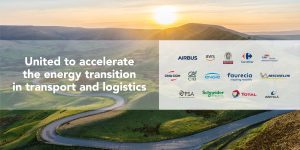Land, sea and air have joined forces in a Coalition for the Energy of the Future (CEF) as the group announces seven key projects for 2021 that will offer green alternatives to logistics solutions.
[s2If is_user_logged_in()]Launched in 2019, CEF was formed to develop new fuels and technologies that will “achieve genuine technological breakthroughs with tangible results by 2030”.
According to the partnership, the CEF has three major goals, to develop an “extensive portfolio” of green energy; to decrease the energy consumption per kilometre of freight in transit; and to reduce the proportion of emissions linked to transport and logistics.

Fourteen companies are now collaborating within the CEF, following the accession of port and terminal operator PSA International, class society Bureau Veritas and Airbus, who join 11 other major and diverse companies, including Amazon Web Services, Carrefour, CMA CGM Group, Cluster Maritime Français, Crédit Agricole CIB, ENGIE, Faurecia, Michelin, Schneider Electric, Total and Wärtsilä.
Tan Chong Meng CEO, PSA International, said CEF’s goals are, “In line with our mission to enable greener logistics choices for all by working with like-minded partners. We are excited to support the development of future energies and technologies, and to do our part to collectively create a more sustainable future for transport and trade.”
Matthieu de Tugny, President of Bureau Veritas Marine and Offshore, highlighted the diversity of the group, “The different stakeholders and experience of this Coalition certainly brings real power across the shipping sector and supply chains to develop the innovative solutions we need.”
He added, “It is a collective approach and all our efforts definitely need to be connected to sustain new green transportation models.”
CEF’s seven major projects:
- Green hydrogen: capitalise on Carrefour projects Cathyope and H2Haul to experiment for the first time in European hydrogen-powered fuel cell long distance zero-emission trucks and propose a consolidated order book for goods’ transportation on French and European roads by end of the first semester in order to accelerate hydrogen availability.
- Biofuel: propose and test the first bio-crude oil dedicated to maritime needs to increase the use of biofuel along the supply chain and develop the use of third generation biofuels.
- Carbon neutral liquefied natural gas (LNG): draw a pathway for bioLNG toward carbon neutrality, highlighting key issues to be addressed.
- Green electricity: identify & convert along the global supply chain the key elements (depots, terminals & warehouses…) into green self-sustained entities to accelerate the electric conversion in the transport chain.
- Zero emission vehicles for road, air and sea transportation: share by the end of the first quarter of 2021 a common vision and roadmap to develop innovative R&D projects around new energies such as Hydrogen or Ammonia.
- Digital eco-calculator of the global transport chain: develop a digital eco-calculator certifying door-to-door CO2 impact on any given transportation routing as well as proposing low-emission alternatives.
- Intermodal green hubs: propose a business plan to sustain port conversion into new green multimodal hubs using lower-impact routing with greener energy by end of 2021.[/s2If]
[s2If !is_user_logged_in()]Please login or register to read the rest of the story[/s2If]







